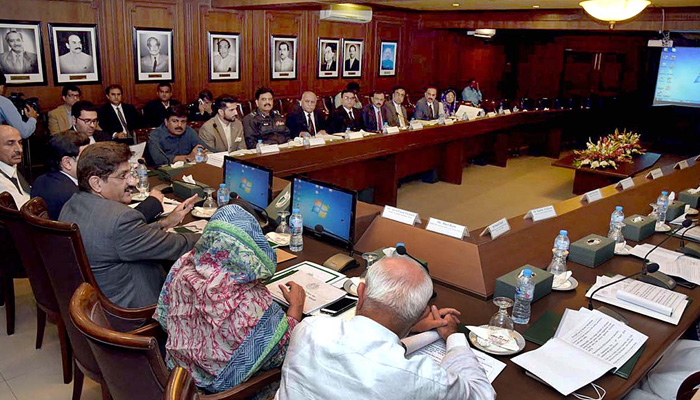Cabinet decides to set up desalination plant in city
In its maiden meeting on Monday, the new Sindh cabinet declared Thar and parts of Umerkot as drought-hit areas, and also decided to allocate land in Karachi for graveyards as well as to establish a desalination plant in the city.
In its maiden meeting on Monday, the new Sindh cabinet declared Thar and parts of Umerkot as drought-hit areas, and also decided to allocate land in Karachi for graveyards as well as to establish a desalination plant in the city.
The newly-appointed eight ministers and two advisors along with the chief secretary, Sindh police chief and other provincial secretaries attended the meeting, which was chaired by CM Murad Ali Shah.
Discussing the budget, CM Shah said that the last PPP government had passed a three-month budget in May to enable the caretaker government to make the necessary expenditures up to September.
It was now time for the new government to make the budget for the remaining year before the end of September and present it in the house, he said. Shah said the province’s financial situation looked grim since they had not yet received the funds that they were expecting from the federal government.
Raising the issue of the use of the Governor House, cabinet members informed that the federal government had decided to vacate the Governor Houses in all four provinces. Therefore, the necessary decision needs to be taken in this regard.
The CM then asked the Board of Revenue’s Senior Member Iqbal Durani as to who held the title of the property of the Sindh Governor House. He was informed that Governor House and its property belonged to the Sindh government.
The cabinet proposed that the house be converted into a museum, while its land should be turned into a public park. Taking about new water supply schemes in Karachi, the chief minister directed the local government minister to start work on a war footing to install a desalination plant in Karachi so that water scarcity could be resolved as soon as possible.
Law and order
Home Secretary Mohammad Haroon told the meeting that the law and order situation in the province was well under control while necessary instructions have been issued to commissioners, deputy commissioners, IG police and DIGs regarding law and order, cleanliness and other arrangements during Eidul Azha.
The cabinet was informed that all DCs have been authorised to issue licenses to dealers/charities to purchase and sell hides/skins of sacrificial animals after necessary verification and completion of legal formalities.
The cabinet was also informed that Standard Operating Procedures regarding animal skin/hides collection had been issued in the both English and Urdu. The list of banned organisations (Schedule IV) has been publicised and provided to all the concerned authorities to ensure strict vigilance on their activities.
IGP Amjad Javeed Saleemi briefed the cabinet on the overall law and order situation and said that movement on the Sindh-Balochistan and Punjab borders is being monitored. The chief minister told the IG that on the eve of last Eidul Azha, a terrorist has carried out a bomb blast in Shikarpur, therefore, the police should take strict security measures in the entire belt of Jacobabad, Shikarpur, Dadu and nearby other districts.
Water for agriculture
Irrigation Secretary Jamal Shah briefed the cabinet about the situation of water for irrigation purposes. He said the rice crop in the province had suffered huge losses due to water shortage.
The Kharif season starts from April 1 and continues up to September 30. The early kharif starts from April 1 to June 10 and the late Kharif is between June 1 and September 30. The early kharif supplies are dependent on water stored in the reservoirs and inflow at rim stations.
The meeting was informed that the Indus River System Authority’s forecast issued in March was too optimistic when they had predicted that there would be 31 percent water shortage in early Kharif and 10 percent shortage in late Kharif in Sindh and Punjab. Later, the IRSA issued another revised prediction stating shortage to 42 per cent, however, the actual shortage was recorded at 58 per cent.
The meeting was told that before entering into early Kharif season both Tarbela and Mangla went dry in the first week of March.
The cabinet was also told that Tarbela has a present capacity of 6.05 and the storage as of April 1 was zero, while the present capacity of Mangla is 7.40 and its storage as of April 1 was also zero. Inflows at Rim Stations showed that 2017 was one of the driest years and this year was even worse.
The water shortage in April was 45 per cent, while it was 53 per cent in May, 38 per cent in June, 14 per cent in July and 25 per cent in August.
The irrigation secretary further said that cotton cultivation has been assigned priority as sowing is seasonally limited to May 31. Supplies for paddy seedlings deferred by one month means from June 10 and transplantation was consequently deferred till July 1. The schedules were publicised for the information of the growers, he said, adding water rotation plan was also publicised and implemented.
The chief minister said that with changing climatic conditions, the water availability situation is expected to get progressively worse.
The irrigation department spelt out possible ways forward which include construction of Diamer-Bhasha Dam, water conservation, switching over from conventional practices of flood irrigation to efficient practices. There was also a suggestion to delay rice sowing season by one-and-half-month – from May 1 to June 15.
The irrigation department suggested the strict implementation of embargo on rice cultivation on command of perennial canals such as Rohri, Nara Canals etc. It was also suggested that high delta crops may be substituted with valuable low delta crops and one watering in non-perennial areas be provided to support oil seed crops that survive on single watering. Ground water resources may be tapped and saline water agriculture may also be promoted. They also suggested construction of Sehwan Barrage Complex with Manchhar Lake as reservoir and Phuleli could be converted into a perennial canal.
The chief minister said that Kinjhar, Haleji, Hadero and other depressions can also be developed as a reliable reservoir for water supply to Karachi and KB Feeder.
The chief minister directed the provincial minister and advisers to visit barrages and get water briefing on the spot and report back to him.
Minister Mir Shabbir Bijarani will visit Guddu Barrage, CM Adviser Mohammad Bux Maher will visit Sukkur Barrage, Ismail Rahu will go to Kotri Barrage and Syed Sardar Shah and Makhdoom Mahboob Zaman will visit left-bank canals of the Sukkur Barrage.
The chief minister said that he had banned the cultivation of rice on the left bank of River Indus. He directed the chief secretary to get a report from all the DCs about the rice cultivation on the left bank of the river so that action could be taken.
Drought in Thar
Board of Revenue Senior Member Iqbal Durrani briefed the cabinet on drought situation in Thar. Drought is a period of usually dry weather that may stretch long enough to cause problems in region such as crop damage, affecting livelihood of people, he said.
Durrani added Mithi Taluka received only 58 millimetres of rain during the last three months, June to August, while Islamkot received 24 mm, Diplo 51 mm, Kaloi 10 mm, Chachhro 105 mm, Dahli 120 mm and Nagarparkar 40 mm. All the 167 dehs of all talukas of Tharparkar and 25 dehs of Umerkot are calamity-hit areas, he said. In Thar 323,435 families have been affected and in Umerkot 43,240 families have been affected.
The BoR recommended that the collection of government revenue in the area may be postponed, as well as remission of government duties such as land tax and agriculture income tax. Wheat may be distributed and funds for relief work may also be released.
The cabinet declared Thar and 25 dehs of Umerkot as calamity-hit areas and decided to give them relief package which includes wheat distribution of 50 kg per family per month.
The chief minister directed the official to seek the drought position of Achhro Thar, Kachho and Kohistan from the concerned deputy commissioners so that the people living there could be helped as well.
The chief minister also constituted a committee comprising Revenue Minister Makhdoom Mahboob Zaman and Education Minister Syed Sardar Shah to visit Thar along with Durrani and the provincial secretaries of health and food to recommend suitable relief measures for drought-affected areas.
-
 Why ‘X’ Is Down? Thousands Report Twitter Outage: Here’s What You Can Do
Why ‘X’ Is Down? Thousands Report Twitter Outage: Here’s What You Can Do -
 Florida Man Held After Alleged Nail-scattering On Busy Intersections
Florida Man Held After Alleged Nail-scattering On Busy Intersections -
 Valeria Nicov: Sean Penn's Athletic Girlfriend Raises Eyebrows With Latest Photos
Valeria Nicov: Sean Penn's Athletic Girlfriend Raises Eyebrows With Latest Photos -
 Sharon Stone Lashes Out At Fellow Award Show Attendees After Stealing Accusations
Sharon Stone Lashes Out At Fellow Award Show Attendees After Stealing Accusations -
 Gwyneth Paltrow Reveals Real Reason She Said Yes To 'Marty Supreme'
Gwyneth Paltrow Reveals Real Reason She Said Yes To 'Marty Supreme' -
 King Charles Says He And Queen Camilla Stand With People Of Ukraine
King Charles Says He And Queen Camilla Stand With People Of Ukraine -
 Ben Affleck Argues In Favour Of His Shirtless Scene In 'The Rip'
Ben Affleck Argues In Favour Of His Shirtless Scene In 'The Rip' -
 Mississippi Postal Worker Arrested After Complaints Of Marijuana Odour In Letters
Mississippi Postal Worker Arrested After Complaints Of Marijuana Odour In Letters -
 Canada, China Lock Initial Trade Deal On ‘EV,Canola’ To Strengthen Ties: What To Expect Next?
Canada, China Lock Initial Trade Deal On ‘EV,Canola’ To Strengthen Ties: What To Expect Next? -
 Melissa Leo On Euphoria Of Winning An Oscar Vs It's Impact On Career
Melissa Leo On Euphoria Of Winning An Oscar Vs It's Impact On Career -
 Meghan Markle, Prince Harry Express 'hope' In Latest Major Statement
Meghan Markle, Prince Harry Express 'hope' In Latest Major Statement -
 Sophie Turner Backs Archie Madekwe As BAFTA Announces Nominees
Sophie Turner Backs Archie Madekwe As BAFTA Announces Nominees -
 Jason Momoa Cherishes Hosting Ozzy Osbourne's Final Gig Ahead Of His Death
Jason Momoa Cherishes Hosting Ozzy Osbourne's Final Gig Ahead Of His Death -
 Real Reason Timothee Chalamet Thanked Kylie Jenner At Awards Revealed
Real Reason Timothee Chalamet Thanked Kylie Jenner At Awards Revealed -
 Will King Charles Attend Funeral Of Prince Philip's First Cousin, Princess Irene?
Will King Charles Attend Funeral Of Prince Philip's First Cousin, Princess Irene? -
 'Furious' Prince William Wants Andrew As Far Away As Possible
'Furious' Prince William Wants Andrew As Far Away As Possible




